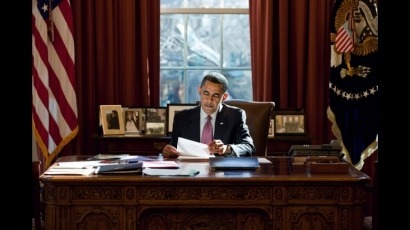
The budget released by the White House today includes a $29.5 billion spending request for the US Dept. of Energy, with a heavy emphasis on investments in renewable and nuclear energy.
The overall budget request is a 12 percent increase over fiscal 2010 spending levels and a 4 percent increase over expected spending levels for the current fiscal year, which ends 30 Sept.
In order to make room in the budget for renewable energy initiatives, Obama is proposing to eliminate billions in tax incentives for the oil and gas industry. A summary of the budget request says eliminating the tax subsidies for oil, gas and other fossil fuel producers would save the government $4 billion a year.
The Obama spending plan includes a $200 million in credit subsidy to support energy efficiency and renewable energy loan guarantees.
It also boosts spending at the agency's Office of Science and the Advanced Research Projects Agency-Energy (ARPA-E), which invest in energy technology research, as well as in the department's renewable energy and energy efficiency research programs.
The request would also double the number of Energy Innovation Hubs in the US, and it would contribute $580 million in advanced technology vehicle research and development in an effort to reach a goal of 1 million electric vehicles on the road by 2015.
The spending plan is the first the president has submitted since Republicans took control of the US House of Representatives in January. Political analysts in the US expect debate over the budget to be contentious and are already predicting that the proposed cuts in tax incentives for the oil industry will likely be a no-go from the start.
The renewable energy, efficiency and science spending increases could also face resistance on Capitol Hill, where House lawmakers are currently debating legislation that would cut about $100 billion in federal spending from the federal budget. Obama’s prospects in the US Senate are also uncertain due to the narrow-margin the Democrats hold there.
The President’s proposal calls for increasing spending for renewable energy and energy efficiency programs at DOE by 42 percent over expected spending levels for the current fiscal year.
Energy efficiency programs for buildings and industry would see the biggest increases under the president's request, at 93 percent and 233 percent over expected 2011 spending levels, respectively.
The department's vehicle technology program would see an 89 percent increase over expected 2011 levels as the administration pushes to reduce the United State’s dependence on fossil fuels.
Under the Obama plan, The DOE’s solar energy, biomass and geothermal energy programs would also see spending increases of more than 50 percent over expected 2011 levels. The department's wind and water energy programs would see modest increases or static funding under the current request.
The proposed budget increases the number of Energy Innovation Hubs, a small group of tightly focused research centres working on particular energy goals, from three to six.
The new hubs would focus on rare earth and other critical materials, battery and energy storage, and smart grid and electric transmission technologies. The three existing hubs are authorized at up to $25 million per year each.
Obama's spending request would also boost DOE's loan guarantee authority for nuclear power plants by $36 billion.
For additional information:

